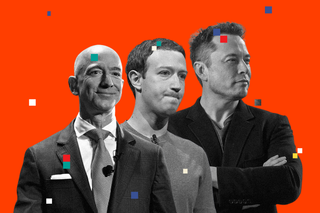
How Tech Turned Away From Progressiveness
A movement whose ideological renaissance happened during the hippie movements of the 60s became a tool for authoritarianism, inequality. How did we get here?

Arguably — tech didn’t just lose its progressiveness. It never was that progressive to begin with.
Elon Musk’s Twitter layoffs doing away with significant portions of the trust and safety related teams are telling of the ideology that’s come to drive big tech. This is not the first time that a big tech platform has undermined freedoms and acted with impunity — but the present situation is all the more stark considering it didn’t always present itself this way.
For one, tech used to be counterculture. In the 1960s, the messy currents of punk, psychedelics, anti-war protests, free love, and bohemian living coalesced into a general culture that was anti-authoritarian — and tech became a tool to further the cause, unspecified as the cause may have been. It was in this context that two influential entities arose: the Homegrown Computer Club — a group of computer enthusiasts who each adhered to DIY-style tech in pursuit of more autonomy — and the Whole Earth Catalog. The former was co-founded by Fred More, a person who wished to resist the Vietnam war draft, wanted to use technology to organize. The latter was written by Stewart Brand, an early hippie who sought to usher in an era of change and autonomy wrought by computers.
“… a realm of intimate, personal power is developing – power of the individual to conduct his own education, find his own inspiration, shape his own environment and share his adventure with whoever is interested. Tools that aid this process are sought and promoted by the Whole Earth Catalog,” he wrote.
Both the Catalog and the club were influential in shaping the worldviews of many tech pioneers who have, in turn, shaped much of the world today — including, famously, Steve Jobs and Steve Wozniak. But somewhere along the way, the movement that was supposed to disrupt state excesses and capitalism came to not only enable, but strengthen both. How?
The first sign of the great Silicon Valley tech experiment going awry is in the debates on intellectual property. One camp argued that information should be free; another said otherwise. Information technology as a sector, then, was built on the foundation that knowledge and technological progress can be owned, marketed, and is sellable.
“This tension is in part related to the complex class status of the individuals and companies making up the tech sector from the moment of its commercial inception. To the extent that they are engaged in activities whose long-term objective is capital accumulation, there is always a need to protect property and profits; so much so that they are engaged in a social project to extend human capacities through the advance of computer technology, there is a certain drive to share information irrespective of profits,” noted Jeremy Gilbert and Alex Williams in Hegemony Now: How Big Tech and Wall Street Won the World (And How We Win it Back).
“The general tendency towards social liberalization has been effected by means of a general individualization and privatization of culture that clearly expresses the priorities of Silicon Valley libertarianism far more fully than it conforms to the forms of collectivist liberation once dreamed of by the counterculture and the New Left,” they added.
Researchers Richard Barbrook and Andy Cameron call it the “Californian Ideology.” Essentially, Silicon Valley tech developments took place under the veneer of autonomy and freedom — when in reality they not only depended a lot on state support, but their vision of freedom was the free market. This, in turn, means competition and profit.
Related on The Swaddle:
Moreover, the seemingly utopian vision was really a quest for going back in time, rather than forward. “This ‘retro-utopia echoed the predictions of Asimov, Heinlein and other macho sci-fi novelists whose future worlds were always filled with space traders, superslick salesmen, genius scientists, pirate captains and other rugged individualists. The path of technological progress leads back to the America of the Founding Fathers,” Barbrook and Cameron wrote.
Critics further note that the problem may have been inherent in tech’s roots itself. The Catalog and the Club, for instance, may have seemed utopian — but in reality, offered “a vision of changing the world… through buying stuff,” The Guardian noted. As a result, there’s an outward appearance of liberalism and progressiveness that still persists, though it is often self-congratulatory and conceals the more reactionary undercurrents of the industry.
One study accordingly found that the people in tech identify as liberal, but they’re less so than they think. “…the hippie-inspired personal computer movement produced a wave of liberal-minded companies, with Apple as their avatar. Over the years, the uncontested perception of the Valley was that of liberal companies led by bleeding-heart CEOs,” Wired noted. But this isn’t this case — and it’s also evident in the kind of donations that big tech makes. Twitter reportedly donated to anti-abortion campaigns, Facebook is a haven for right-wing content and even radicalization.
It’s begun to manifest today as overt conservatism among employees within tech companies — like Google — who’ve become more outspoken in their distaste for liberalism.
Elon Musk, whom Wired called “the closest thing that tech has to a philosopher-king,” arguably leads the charge on politically ambiguous tech leadership. He’s recently begun endorsing the Republican Party in public — but his persona has been that of a visionary whose ideas aren’t constrained by any one ideology.
“… rather than ushering in a new type of flexible capitalism that would rid us of giant, wasteful and hierarchical firms, it may be making the kind of capitalism it claims to despise far more resilient, dynamic and — the ultimate irony — difficult to disrupt,” Evgeny Morozov noted that the result of all this has been that tech ushered in a version of capitalism that’s become much more difficult to disrupt.
“At that time, computers weren’t hip. They weren’t cool. They were controlled by faceless corporations and the military. They were Big Business and authority, or, as they said then, ‘The Man,'” The Guardian noted.
In the era of having to pay for a verification badge, smaller trust teams within tech, and profit-driven surveillance and digital capitalism, however, big tech is The Man.
Rohitha Naraharisetty is a Senior Associate Editor at The Swaddle. She writes about the intersection of gender, caste, social movements, and pop culture. She can be found on Instagram at @rohitha_97 or on Twitter at @romimacaronii.
Related


A VR Headset Can Kill a User Who Dies in a Game
